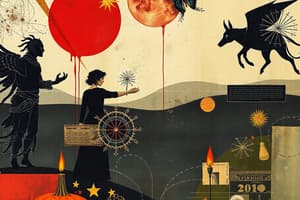Podcast
Questions and Answers
What distinction is typically made between 'white magic' and 'black magic'?
What distinction is typically made between 'white magic' and 'black magic'?
- White magic is considered beneficial, while black magic is seen as more sinister. (correct)
- Black magic is associated with blessings, while white magic is linked to curses.
- White magic involves harming others, while black magic is used for healing purposes.
- Black magic focuses on good luck, while white magic focuses on misfortune.
What role does magic play in Hinduism and Buddhism according to the text?
What role does magic play in Hinduism and Buddhism according to the text?
- Magic is rejected in both religions.
- Magic is only present in Buddhism.
- Hinduism includes tales of miraculous feats but not magic.
- Both incorporate elements of magic into their belief systems. (correct)
In Christianity, where have magical practices been observed according to the text?
In Christianity, where have magical practices been observed according to the text?
- North America
- Europe
- Africa (correct)
- Asia
What do some argue about the existence of real magic according to the text?
What do some argue about the existence of real magic according to the text?
What aspect of magic continues to fascinate and inspire people according to the text?
What aspect of magic continues to fascinate and inspire people according to the text?
What is magic primarily defined as in the text?
What is magic primarily defined as in the text?
Which of the following is NOT mentioned as an example of magical practices in the text?
Which of the following is NOT mentioned as an example of magical practices in the text?
How does the text describe the relationship between magic and science?
How does the text describe the relationship between magic and science?
Which scientific concept mentioned in the text was once considered magical due to its mysterious power?
Which scientific concept mentioned in the text was once considered magical due to its mysterious power?
What do ancient Egyptian mythology and Greek mythology have in common based on the text?
What do ancient Egyptian mythology and Greek mythology have in common based on the text?
What aspect of quantum mechanics is likened to magical behavior in the text?
What aspect of quantum mechanics is likened to magical behavior in the text?
Flashcards are hidden until you start studying
Study Notes
Introduction to Magic
Magic is a fascinating and intriguing concept that has captivated human imagination throughout history, appearing in various forms across cultures around the world. It refers to the practice of manipulating energies, forces, and phenomena within the natural world for supernatural purposes. This could involve summoning elemental powers such as fire, water, air, and earth, commanding spirits and demons, or invoking deities. In essence, magic represents the ability to transcend the known laws of nature through intentional actions and manifestations.
In today's modern society, where science dominates our understanding of reality, magic often seems like a far cry from rationality. However, it is important to acknowledge that the line between science and what we consider magic can sometimes be blurry. For instance, consider electricity, which was once considered magical due to its mysterious power over light and heat. Over time, it became part of our scientific understanding of how energy works. Similarly, quantum mechanics, which deals with very small things like atoms, electrons, and photons, appears to be almost magical in its seemingly unpredictable behavior.
The idea of magic has been present in countless mythologies and religious traditions. For example, ancient Egyptian mythology shows us gods who embody aspects of nature, while Greek mythology includes stories about heroes battling monsters and warring against their fellow man. In India, Hinduism and Buddhism both incorporate elements of magic into their belief systems, with the latter including tales of miraculous feats performed by bodhisattvas. Magical practices have also appeared in Christianity, particularly among Christians in Africa, where certain rituals are associated with the spiritual life of the community.
However, even within these contexts, there is often a distinction made between "white magic," which is generally considered beneficial, and "black magic," which is seen as more sinister. White magic might involve spells for healing or protection, while black magic would typically focus on curses, death, and other darker themes.
Despite its prevalence in various cultural narratives, the existence of real magic remains debatable. Many argue that any perceived supernatural event can be explained through natural causes, such as misperception, coincidence, or fraudulent means. On the other hand, some believe that there may still be undiscovered phenomena beyond the scope of current scientific understanding.
In conclusion, magic is a complex and multifaceted concept that has captured the human imagination for centuries. Its presence in numerous cultural narratives suggests a deep-seated need for explanations beyond those offered by traditional sciences. Whether it's a reflection of our innate curiosity or a testament to the elasticity of the human mind, magic continues to fascinate and inspire.
Studying That Suits You
Use AI to generate personalized quizzes and flashcards to suit your learning preferences.




